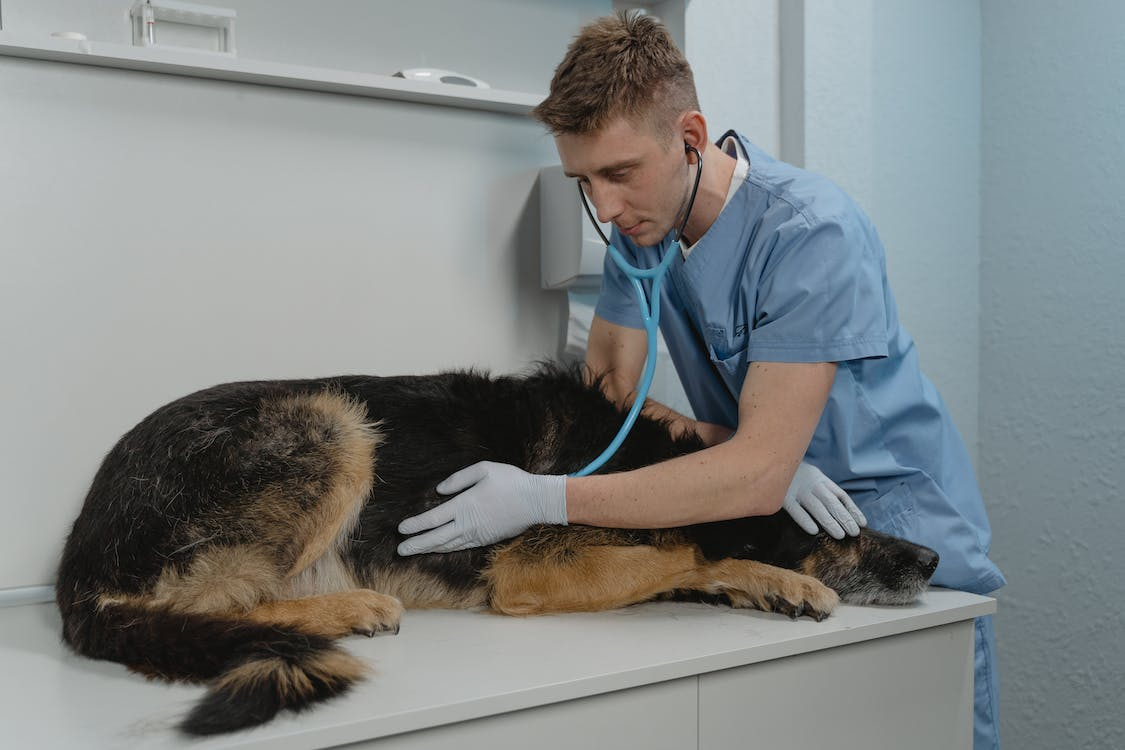Australian Shepherds, commonly known as Aussies, are highly intelligent, energetic, and versatile dogs that have become popular companions, working dogs, and competitors in various dog sports. Like any other breed, Australian Shepherds are susceptible to certain health conditions, some of which are hereditary.
To ensure the overall well-being and longevity of Aussie dogs, it is important for breeders and owners to prioritize health testing. Health testing plays a crucial role in identifying potential genetic disorders, reducing the risk of passing on hereditary diseases to future generations and enabling responsible breeding practices.
By conducting recommended health tests for Australian Shepherds, breeders, and owners can make informed decisions about breeding pairs, provide appropriate care, and contribute to the overall improvement of the breed’s health.
In this article, we will explore some of the recommended health tests for Australian Shepherds. It is important to note that while these tests are highly recommended, they may not guarantee that a dog will be completely free from health issues.
However, they significantly increase the likelihood of breeding healthier dogs and reducing the risk of certain hereditary conditions.
Why is Health Testing Important for Australian Shepherds?
Health testing is crucial for Australian Shepherds to identify and address potential genetic disorders and health concerns. It allows breeders and owners to make informed decisions about breeding, provides early detection of diseases, and promotes the overall well-being of the breed.
What Are the Common Health Concerns in Australian Shepherds?

Australian Shepherds are prone to certain health conditions such as hip dysplasia, progressive retinal atrophy (PRA), epilepsy, autoimmune disorders, and various hereditary eye diseases. Regular health testing helps identify these issues and take appropriate measures. Understanding these common health issues allows for proactive management and early intervention, ensuring a healthier and happier life for these wonderful dogs. Let’s explore some of the most prevalent health concerns in Australian Shepherds.
Hip Dysplasia
Hip dysplasia is a common orthopedic condition characterized by abnormal development of the hip joint. It can cause pain, lameness, and mobility issues in affected dogs. Australian Shepherds have a moderate risk for hip dysplasia, and it is crucial to conduct hip evaluations, such as hip radiographs, to identify potential hip abnormalities.
Responsible breeders prioritize breeding dogs with good hip scores to reduce the risk of passing on this condition to their offspring.
Elbow Dysplasia
Elbow dysplasia is another orthopedic condition that affects the elbow joint, causing lameness, pain, and stiffness in affected dogs. Australian Shepherds can be prone to elbow dysplasia, and elbow evaluations are recommended to assess the health of the elbows.
Similar to hip dysplasia, breeding dogs with good elbow scores helps reduce the incidence of this condition in future generations.
Ocular Conditions
Australian Shepherds may be predisposed to various eye diseases, including progressive retinal atrophy (PRA), cataracts, and collie eye anomaly (CEA).
PRA is a degenerative condition of the detached retina that leads to progressive vision loss, while cataracts can cause cloudiness and impaired vision. CEA is a congenital condition that affects the development of the retina. Regular eye exams and examinations by a veterinary ophthalmologist can help identify and manage these conditions.
Epilepsy
Epilepsy is a neurological disorder characterized by recurring seizures. Australian Shepherds have been known to have a higher prevalence of epilepsy compared to some other breeds. While the exact causes of epilepsy in Aussies are not fully understood, ongoing research aims to identify potential genetic and environmental factors.
Early diagnosis and appropriate management, often involving anticonvulsant medications, can help improve the quality of life for affected dogs.
Allergies
Australian Shepherds can be prone to allergies, including food allergies, environmental allergies (such as pollen or dust mites), and contact allergies (such as reactions to certain grooming products). Allergies can manifest as skin irritations, itching, redness, and gastrointestinal issues.
Identifying and managing triggers, along with dietary modifications and allergy testing, can help alleviate symptoms and improve the comfort of affected dogs.
Cancer
Cancer can affect Australian Shepherds, as it can occur in any breed. Common types of cancer seen in Aussies include hemangiosarcoma, lymphoma, mast cell tumors, and osteosarcoma. Regular veterinary check-ups and early detection are crucial in increasing the chances of successful treatment and improving the prognosis.
How Can Health Testing Help Prevent Genetic Disorders in Aussie Dogs?
Health testing aids in identifying carriers of genetic disorders, allowing breeders to make informed decisions about breeding pairs. By selectively breeding only healthy dogs, the risk of passing on genetic disorders can be significantly reduced, promoting healthier offspring.
Are There Specific Health Tests Recommended for Australian Shepherds?
Yes, several health tests are recommended for Australian Shepherds. These may include hip and elbow evaluations, ophthalmologic exams, DNA tests for hereditary conditions, hearing tests, and thyroid function tests. Consult with your veterinarian or a reputable breed-specific organization for specific recommendations.
When Should You Start Health Testing for Your Australian Shepherd?
Ideally, health testing should begin early in your Australian Shepherd’s life. Some tests, like DNA tests for hereditary conditions, can be done when the dog is a puppy. Other tests, such as hip and elbow evaluations, may be performed once the dog reaches a certain age or maturity level.
The ideal time to begin health testing for your Australian Shepherd largely depends on the specific tests being conducted.
Some tests can be performed as early as a few months old, while others may be more appropriate to schedule later in your dog’s life. Here are some key considerations for different health tests and their recommended timing:
Basic Physical Examination
A thorough physical examination by a veterinarian is the foundation of your dog’s healthcare. This examination should begin in the early stages of your Aussie’s life, shortly after bringing them home. Regular check-ups will allow your veterinarian to monitor your dog’s growth, detect any abnormalities, and provide preventive care.
Genetic Testing
Genetic testing can help identify potential inherited diseases or genetic traits within your Australian Shepherd. While some tests can be conducted at any age, others are more relevant for specific stages of your dog’s life.
For example, tests for progressive retinal atrophy (PRA) or multi-drug sensitivity (MDR1) can be performed at a young age to assess their genetic status. On the other hand, tests for hip dysplasia or elbow dysplasia are typically done when your Aussie reaches skeletal maturity, usually between 12 and 24 months of age.
Eye Examinations
Eye examinations are crucial for assessing your Australian Shepherd’s ocular health and detecting any potential eye defects or disorders. Initial screenings for common eye conditions, such as progressive retinal atrophy (PRA) or cataracts, can be done as early as 6 to 8 weeks old. However, some eye diseases may require re-evaluation and follow-up examinations as your dog matures.
Cardiac Evaluation
Cardiac evaluations, such as echocardiograms or auscultations, are used to assess the health of your Aussie’s heart and detect any cardiac abnormalities. Depending on the breed and individual circumstances, cardiac evaluations may be recommended around 1 to 2 years of age or later in life if there are specific concerns or symptoms.
It is important to note that the specific timing and tests may vary based on regional or breed-specific recommendations.
Consulting with your veterinarian or a specialized veterinary professional is crucial to determine the most appropriate time to initiate health testing for your Australian Shepherd. They can provide guidance based on your dog’s individual needs and the prevalent health concerns within the breed.
Can Health Testing Help Improve the Overall Breed Health of Australian Shepherds?
Yes, health testing plays a crucial role in improving the overall breed health of Australian Shepherds. The health and well-being of Australian Shepherds, a beloved and active breed, are of paramount importance to responsible dog owners and breeders. One crucial tool in achieving this goal is health testing.
Health testing refers to a series of diagnostic procedures conducted to assess the overall health of dogs, including screening for genetic and hereditary conditions. In the case of Australian Shepherds, health testing plays a vital role in improving the breed’s overall health and ensuring a brighter future for these remarkable dogs.
One of the key benefits of health testing for Australian Shepherds is the identification of genetic and hereditary conditions. By conducting specific tests, such as hip and elbow evaluations, eye examinations, and genetic screenings, breeders can identify potential health issues that may be present within the breed.
These tests enable breeders to make informed decisions about which dogs are suitable for breeding and which should be excluded from the breeding program. By eliminating dogs with known health problems from the breeding pool, the risk of passing on these conditions to future generations is significantly reduced.
Moreover, health testing helps in the detection of hidden or recessive genetic traits. Australian Shepherds, like any other breed, can carry genetic mutations that may not be apparent from their physical appearance alone.
These hidden traits can potentially contribute to the development of various health conditions. Through genetic testing, breeders can identify carriers of specific mutations and make careful breeding choices to prevent the occurrence of these conditions in subsequent generations.
This proactive approach not only promotes healthier individuals but also helps maintain the breed’s overall genetic diversity. Another significant aspect of health testing is the prevention of common hereditary diseases.
Australian Shepherds are known to be susceptible to certain health conditions, including hip dysplasia, epilepsy, progressive retinal atrophy, and autoimmune disorders. Through health testing, breeders can screen their breeding dogs for these conditions and choose mates that are clear or have a lower risk of passing on these diseases.
By selecting breeding pairs with favorable health test results, the likelihood of producing offspring with inherited diseases is greatly reduced, improving the overall health of the breed.
Health testing also contributes to the ongoing research and understanding of breed-specific health concerns. The data collected from health tests can be used for research purposes, providing valuable insights into the prevalence and genetic basis of certain conditions within the Australian Shepherd population.
This information can help researchers and breed clubs develop targeted breeding strategies and educational initiatives to further enhance breed health. It allows breeders to stay informed about emerging health trends, advances in medical knowledge, and new testing protocols that can contribute to the continual improvement of breed health.

How Do Health Tests Assist in Responsible Breeding Practices for Aussies?
Health tests enable responsible breeders to make informed decisions when selecting breeding pairs. By ensuring that both parents are free from genetic disorders and health issues, breeders can minimize the risk of passing on these conditions to future litters.
These tests help breeders make informed decisions about which dogs are suitable for breeding and which should be excluded from the breeding program. Health tests can detect a range of conditions, including hip and elbow dysplasia, eye diseases, hereditary cataracts, progressive retinal atrophy, and certain genetic disorders.
By screening for these conditions, breeders can minimize the risk of passing on inherited diseases to future generations. Responsible breeders prioritize the health and well-being of their dogs, aiming to produce litters that are free from genetic health problems.
Health tests provide valuable information that allows breeders to select breeding pairs that are likely to produce healthy offspring with a reduced risk of hereditary diseases. This approach helps to preserve and improve the overall health of the Australian Shepherd breed, ensuring that future generations of Aussies can enjoy a higher quality of life.
Are There Differences in Health Testing Requirements for Show and Companion Australian Shepherds?
While health testing requirements may vary, responsible breeders typically prioritize health testing for both show and companion Australian Shepherds.
Regardless of their intended purpose, all dogs benefit from being bred from healthy individuals to maintain the breed’s overall health and well-being.
What are the Costs Involved in Health Testing for Australian Shepherds?
The costs of health testing for Australian Shepherds can vary depending on the specific tests required and the location. DNA tests for hereditary conditions may range from $50 to $200 per test, while orthopedic evaluations and ophthalmologic exams can cost between $100 and $300. It is important to consider these expenses when planning for the overall care of your Australian Shepherd.
In this article, we will explore the various costs involved in health testing for Australian Shepherds, helping breeders and owners understand the financial considerations associated with maintaining the health of their beloved dogs.
Testing Fees
Health testing typically involves specific diagnostic tests performed by veterinary professionals or specialized laboratories. The costs of these tests can vary depending on the type and complexity of the examination.
For Australian Shepherds, common health tests may include hip and elbow evaluations, eye examinations, DNA testing for genetic disorders, and more. The fees for these individual tests can range from around $100 to several hundred dollars per test.
Breeding Stock Screening
Breeders who are dedicated to maintaining the health of their Australian Shepherds often opt for additional screening tests for their breeding stock. These tests help identify potential health issues and ensure that only healthy dogs are used for breeding.
These screenings may include additional genetic tests, thyroid evaluations, cardiac screenings, and more. The costs of breeding stock screening can add up significantly, ranging from a few hundred to over a thousand dollars per dog.
Pre-breeding Health Checks
Before breeding an Australian Shepherd, it is essential to ensure that both the male and female dogs are in optimal health. Pre-breeding health checks often involve comprehensive examinations, including general health assessments, reproductive evaluations, and infectious disease testing.
These assessments are crucial for identifying any underlying health issues that could potentially affect the breeding process and the health of future litters. The costs of pre-breeding health checks can vary but typically range from a few hundred to several hundred dollars per dog.
Follow-up and Maintenance Testing
Health testing is not a one-time event it requires ongoing monitoring and maintenance throughout the dog’s life. This includes periodic retesting for certain conditions and staying updated with advancements in health testing protocols.
The costs of follow-up and maintenance testing will depend on the specific tests recommended by veterinarians or breed-specific health organizations. It is important to budget for these recurring expenses to ensure the continued health and well-being of Australian Shepherds.
Additional Considerations
In addition to the direct testing costs, it is important to consider other associated expenses. These may include veterinary consultation fees, travel costs to specialized clinics or laboratories, and potential expenses related to the management of any identified health conditions.
It is advisable to consult with reputable veterinarians and breeders to estimate the overall costs involved in health testing and to plan accordingly.
| Test | Description | Recommended Frequency |
|---|---|---|
| Hip Dysplasia Evaluation | An assessment of the hip joint’s health and stability to identify the risk of dysplasia. | Once between 12-18 months |
| Elbow Dysplasia Evaluation | An evaluation to detect abnormalities or degenerative changes in the elbow joint. | Once between 12-18 months |
| Eye Examination | A thorough examination to detect inherited eye diseases, such as cataracts or progressive retinal atrophy. | Annually |
| Collie Eye Anomaly (CEA) DNA Test | A genetic test to identify carriers of the CEA gene, which can lead to eye abnormalities. | Once in a lifetime |
| Multi-Drug Sensitivity (MDR1) DNA Test | A genetic test to determine the presence of the MDR1 mutation, which affects drug sensitivity in Australian Shepherds. | Once in a lifetime |
How Frequently Should Australian Shepherds Undergo Health Testing?
The frequency of health testing depends on the specific tests and the recommendations of your veterinarian or breed-specific organizations. Some tests, like DNA tests for hereditary conditions, may only need to be performed once in a dog’s lifetime.
Other tests, such as hip evaluations, may be recommended periodically, especially for breeding dogs. In this article, we will explore the factors to consider when determining how frequently Australian Shepherds should undergo health testing to ensure their ongoing health and well-being.
Age and Life Stage
The age and life stage of an Australian Shepherd plays a significant role in determining the frequency of health testing. As puppies, they may undergo initial health evaluations and receive necessary vaccinations.
However, the majority of breed-specific health tests are recommended for adult dogs. Generally, health testing for adult Australian Shepherds begins around 12-18 months of age. After the initial round of tests, the frequency of testing may vary depending on the specific health concerns prevalent in the breed.
Breed-Specific Health Concerns
Australian Shepherds are prone to certain hereditary health conditions such as hip dysplasia, elbow dysplasia, progressive retinal atrophy (PRA), and collie eye anomaly (CEA). The recommended frequency of health testing often depends on the prevalence and severity of these conditions within the breed.
Consultation with reputable breeders, veterinary professionals, and breed-specific health organizations can provide valuable insights into the appropriate timing and frequency of testing for specific conditions many breeds.
Breeding Program Considerations
For breeders, maintaining a comprehensive and responsible breeding program involves regular health testing. The frequency of testing for the breeding stock may differ from that of pet Australian Shepherds.
Breeders often conduct initial health tests before breeding, and subsequent testing may be performed at regular intervals to ensure the continued health of their breeding dogs.
Consultation with veterinary professionals and adherence to breed-specific health guidelines can help determine the optimal frequency of testing for breeding stock.
Advances in Testing Technologies
Advancements in veterinary medicine and genetic testing technologies continue to improve the accuracy and efficiency of health testing. It is important for breeders and owners to stay updated on the latest testing protocols and recommendations.
Periodic discussions with veterinary professionals and breed-specific health organizations can provide insights into any new testing methods that may be available, leading to more informed decisions regarding the frequency of testing.
Ongoing Monitoring and Maintenance
Health testing is not a one-time event but rather an ongoing process. Regular monitoring and maintenance testing is essential to detect any emerging health issues or changes in a dog’s condition.
The frequency of follow-up testing will depend on the specific health concerns identified in the initial testing, as well as the recommendations of veterinary professionals. Routine check-ups and discussions with veterinarians can help determine when additional testing may be necessary.
Is Health Testing Necessary for Mixed Breed Australian Shepherds?
While health testing is typically associated with purebred dogs, it can also be beneficial for mixed-breed Australian Shepherds. Testing can help identify potential genetic risks and guide responsible breeding practices.
Although mixed breeds have a broader genetic diversity compared to purebreds, they can still inherit certain health conditions from their parent breeds. Health testing can help identify potential issues that may affect the well-being of mixed-breed Aussies and allow owners to take proactive measures to manage or treat these conditions.
It provides valuable insights into the overall health of the dog, regardless of their mixed heritage, enabling responsible owners to provide appropriate care and potentially prevent future health complications.

Are There Alternative Approaches to Health Testing for Australian Shepherds?
In addition to traditional health testing methods, there are alternative approaches available, such as genetic screening panels that analyze multiple genetic markers simultaneously. These panels can provide comprehensive information about a dog’s genetic health, allowing breeders to make informed decisions about breeding.
One such approach is genetic testing, which involves analyzing the dog’s DNA to identify genetic mutations associated with various health conditions. Genetic testing can provide valuable information about an Aussie’s genetic makeup and potential risks for inherited diseases. It can be particularly useful for identifying carrier status, which helps breeders make informed decisions to prevent the transmission of genetic disorders.
Additionally, regular veterinary check-ups, including physical examinations and blood tests, are essential for monitoring the general health of Australian Shepherds and detecting any emerging health issues.
Can Health Testing Results Impact Your Australian Shepherd’s Insurance Coverage?
Yes, health testing results can have an impact on your Australian Shepherd’s insurance coverage. Insurance companies may consider pre-existing conditions or known health issues when determining coverage eligibility or setting premiums.
If your Aussie has a history of health problems revealed through health testing, it may affect the terms of your insurance policy. It is crucial to carefully review the insurance provider’s policies and understand how health test results can impact coverage.
By being transparent about your dog’s health and providing accurate information, you can ensure that your Australian Shepherd receives the appropriate coverage and necessary care.
How Can Health Testing Contribute to a Longer Lifespan for Australian Shepherds?
Health testing plays a significant role in contributing to a longer lifespan for Australian Shepherds. By identifying potential health issues early on, owners and breeders can take proactive measures to manage and treat these conditions, ultimately improving the overall health and well-being of the dogs.
Regular health tests can help detect common genetic disorders, such as hip dysplasia or eye diseases, allowing for appropriate interventions or lifestyle adjustments to mitigate the impact of these conditions. Additionally, health testing promotes responsible breeding practices, reducing the likelihood of passing on inherited diseases to future generations.
By prioritizing the health of Australian Shepherds through testing, owners, and breeders can work together to ensure a longer, healthier life for these beloved dogs.
What Precautions Should You Take During the Health Testing Process?
During the health testing process for Australian Shepherds, it is essential to take certain precautions to ensure accurate results and the well-being of the dogs. First and foremost, choose reputable veterinarians or specialized testing facilities that have experience in conducting the specific tests required for Aussies.
Follow the recommended testing protocols and schedule regular screenings as recommended by professionals. It is crucial to provide a stress-free environment for the dog during the testing process to minimize anxiety and discomfort. Follow any pre-test instructions, such as fasting requirements, and ensure that your Aussie is well-rested and relaxed before undergoing any procedures.
Lastly, communicate openly with the veterinary team, providing complete and accurate information about your dog’s health history and any observed symptoms. By taking these precautions, you can optimize the testing process and ensure the well-being of your Australian Shepherd.
Wrapping Up
While health tests do not guarantee that a dog will be completely free from health issues, they significantly increase the chances of breeding healthier dogs and minimizing the occurrence of hereditary conditions.
Regular health testing should be an ongoing commitment throughout the life of an Australian Shepherd to ensure early detection of any potential health issues and timely intervention.
In conclusion, health testing for Australian Shepherds is a vital aspect of responsible breeding and ownership. By adhering to recommended tests and making informed decisions, breeders and owners can contribute to the long-term health and well-being of the Aussie breed, providing them with the best possible quality of life.




